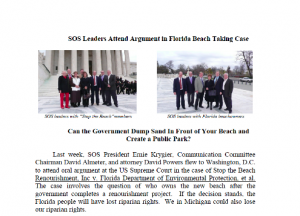United States Supreme Court Hears Oral Arguments in Florida Beach Case
The following is from Michigan Save Our Shoreline (SOS), who you remember fought to keep Michigan private beach property from trespassers and lost. They have been following a similar case in Florida and filed an Amicus brief in the case.
The state of Florida enacted a law saying, in essence, that the state owns that part of the beach restored by the government. Homeowners on the beach in Destin, Florida challenged the law, saying it resulted in a taking of their right to own to the water, which in Florida is the mean high tide line. The Florida Supreme Court held that the law did not violate the constitution by taking property from the homeowners because their right to own to the water never existed in the first place.
This was the same trick that the state of Michigan used in 2005 to turn Michigan’s beaches into a public thoroughfare. In the case of Glass v. Goeckel, the Michigan Supreme Court simply ignored 160 years of case law holding that waterfront owners had “exclusive use of the bank and shore,†and created a public right to walk the dry beach. By using its courts to change the law, Michigan effectively took our private beach rights and turned them into public property, thereby avoiding the constitutional requirement that it pay just compensation.
Five justices seemed quite critical of Florida’s bold move. Some pointed out that under Florida’s view, the state could expand the beach simply to make room for spring breakers to party in front of the waterfront homes. Justice Scalia even proposed a name for the new law: the “Spring Break Act,†to much laughter from the Court audience. If it wanted, Florida might even build an amusement park in front of the homes. He told Florida’s lawyer that the common law in most states was that beachfront owners owned to the water, and that beachfront owners would be surprised to learn they did not own to the water. Justice Breyer and the new Justice, Sotomayor, argued that the beachfront owners lost nothing. In response to the suggestion that an owner might now find a hot dog vendor out on the beach in front of their home, Justice Sotomayor pointed out that before the re-nourishment, that vendor could have stayed in the same spot, although he would have been in the water, and the landowner would have been powerless to stop him.
The key to the decision will likely be Justice Kennedy, who pointed out concerns on both sides of the issue, but who seemed concerned about a taking. To the argument that the landowners received rights from the government equivalent to the rights they lost (and thereby really lost nothing), the conservative justices suggested that the way to decide that was to find a taking occurred, and then send the case back to the Florida courts for a determination of the value of the loss, if any. This seems to be the best suggestion we heard.
We expect a decision on the case in the spring or early summer of 2010. For more information, look for the SOS Amicus Brief and a transcript of the Supreme Court hearing at http://www.saveourshoreline.org. You may find the transcript very interesting, while long to read.

